Animal Requiem - A MUSICAL CELEBRATION OF OUR ANIMAL FRIENDS LOVED AND LOST
Rachel Fuller
 The Who song, It's Not Enough, was co-written by the wife of Pete Townshend. However, there is no need to mention his name again when referring to his wife, Rachel Fuller, as she is an incredible musician on her own right and a big animal lover.
The Who song, It's Not Enough, was co-written by the wife of Pete Townshend. However, there is no need to mention his name again when referring to his wife, Rachel Fuller, as she is an incredible musician on her own right and a big animal lover.
Rachel is currently in Los Angeles in a hotel while The Who is on tour in the United States. As we talked to Rachel, she was sitting in Pete's study room surrounded by all his computers and gadgets.
When asked if she was ever inspired to mess with his gadgets, Rachel explains that she's not very good with gadgets and leaves all the gadgets to Pete. She claims to be a terrible Luddite. She says she doesn't even like to play an electric piano, preferring a real one.
Rachel says she started playing the piano when she was about nine. She even spent a lengthy stint as an organist in a funeral home. On a good day, there would be 11 funerals and she was playing for the services. She worked there for about two years. So over time she added it up and said she must have played for about 2,500 funerals.
When playing at a funeral, you are not in front of a real audience and they're not going to be applauding you afterwards. In order to do this, Rachel said she had to be fairly detached from what was going on emotionally. She said it was a strange thing to do and looking back, she thinks she'd have been much better off working at McDonald's or even a clothing store, but that's where she ended up working. She did, however, feel like she was doing a service. She also felt it was a privilege, she supposes, to be playing music for something so important.
Along with being a musician, Rachel is a big animal lover. At one time she even had a dog named Wistle, who was named after John Entwistle, who was an English bass guitarist, singer, songwriter and film and music producer. Rachel obtained Wistle about 14 years ago. It was Pete's 60th birthday and a friend of theirs, Jerry Hall, said to her, "What can I get Pete for his birthday?" Rachel told Jerry that they'd always had big dogs and Pete had always wanted a Yorkshire Terrier. This was because he was a childhood friend with John Entwistle and John's mother always had Yorkshire Terriers. So Pete had a sort of nostalgic fondness for them. Rachel wasn't sure about this breed, as they are really small and yappy. She actually preferred a big dog that you could sort of get into bed with and spoon. But anyway, she thought she should let Pete have what he wanted. So Jerry bought them this little Yorkshire Terrier who they named Wistle. Wistle immediately became Rachel's shadow and followed her to the toilet and slept on her head for 13 years. Unfortunately they lost Wistle last October.
Rachel tells us they currently have four dogs. They have an Irish Terrier called Tuppence that they rescued from Antigua in March. They also have two little ones. They have a Yorkshire Terrier called Peanut, because after they lost Wistle, Rachel told Pete that she couldn't live without someone following her to the toilet and following her around the house. So they got Peanut. They also have a mutt who is part Yorkshire Terrier, part Chihuahua and part Rottweiler called Pudding.
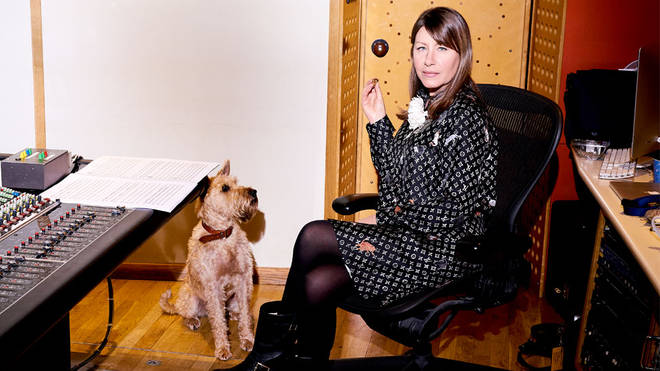 Rachel admits that all of her dogs are really spoiled. She does say that the big girls don't sleep in bed with them, but not because she's worried about them hogging the bed or anything, but just because they get up at half past five to go for a walk and that doesn't work for her. But she has trained the little ones from birth to sleep in so they get up when she gets up.
Rachel admits that all of her dogs are really spoiled. She does say that the big girls don't sleep in bed with them, but not because she's worried about them hogging the bed or anything, but just because they get up at half past five to go for a walk and that doesn't work for her. But she has trained the little ones from birth to sleep in so they get up when she gets up.
When spoiling her dogs, does Rachel do anything over the top? She says their entire lives are spoiled, but she does admit that the little ones like to drink Evian from a glass, which is quite spoiled to her. That all started with Wistle and by the time Wistle left them, she wouldn't drink from a dog bowl. She would only drink from a glass and she would only drink bottled water.
Along with music and taking care of their animals, Pete and Rachel do a lot of sailing, which Pete particularly enjoys. So they holiday quite a lot on the beautiful Island of Antigua in the Caribbean. Rachel says that there was a period of time when they would spend four to six weeks there over the winter. One day, Rachel said to Pete, "I'm going to have to do something cause I'm going to go nuts if I just sunbathe." So she found out that there was an animal rescue on the island. She then thought she would just go down and volunteer for a couple of days a week. She could clean the kennels, serve the dog food, pick up dog poo and even take them for walks.
Of course, a long story short, she ended up buying the shelter. The shelter at the time was renting the land that they were on. It then came up for sale so they were going to get kicked off. Rachel doesn't run it personally. She says it's a small shelter and the only shelter on the Island and they do amazing things. The people who work there have dedicated their lives to helping stray animals and those that have been abused. Unfortunately, there's a fairly big problem with stray dogs in Antigua, but they are working on spaying and neutering programs. So positive changes are being made.
On top of all of this, Rachel also fosters dogs. She would always foster a puppy, maybe for six weeks, that was covered in mange and covered in ticks. The dogs would come straight into her bed and she would do her best to patch them up and then rehome them before they left the island and headed back to the UK.
A couple of years ago they actually ended up bringing one back with them. So one of the dogs that they currently have in the UK is from Antigua. Rachel considers herself the true definition of a foster failure. She claims that she would keep them all if she could.
As mentioned previously, Rachel is an incredible musician and has a brand new CD out called Animal Requiem.
Rachel did the orchestral Quadrophenia, which she says was loads of fun from a work point of view. Then she wrote a theater musical, which is in production, with the album coming out next year. Once she'd finished writing the music for that, she really wanted to write a requiem. She had always wanted to write a requiem, something completely different from the orchestral stuff, different from Quadrophenia and different from the theater. She wanted to do a classical piece of music. She doesn't really know when the bingo moment was, but a requiem is a mass for people who've passed. It's a mass for the dead. And without sounding maudlin, it's actually a memorial. It's a celebration of the life and an honoring and a remembering. If you go to a memorial service, it's that kind of thing.
There were many dogs that Rachel and Pete had amassed in their lifetimes and they had a pack of six dogs for really long time. Unfortunately, they all got old around the same time, so they started to pass away. The grief is tough for anybody who's been lucky enough to have an animal in their life for a long period of time and when they pass, it's like losing a family. If you have a connection with animals, their passing is terrible.
Rachel had a lot of grief in a four or five-year period and one day she thought that the requiem should be written as a memorial to all the animals that come in and out of our lives. Sometimes we have our pets for 15 to 18 years, sometimes for much less. But the bond and the relationship is so special that she felt that we should have a way to honor them. To have a quiet half hour perhaps at home just listening to some music and remembering them and thinking about them and all the funny things that they used to do. Maybe even light a candle. Her hope was that people would perform it as a concert all around the world and invite local people to come and remember their animals.
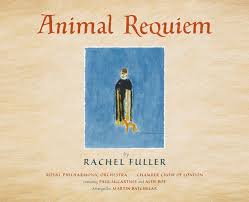 While Pete didn't help Rachel compose her Animal Requiem, she did have help from Paul McCartney. Rachel tells us that Paul let her have one of the original Beatles tracks on the album. Paul is also a huge animal welfare campaigner and activist and has been for decades and decades. So after she'd finished writing the requiem, she really wanted an additional track on the album, which was more to do with just sort of awareness and consciousness around animals and their welfare and their suffering in the world. So she wrote a letter to Paul to ask if he would let her have Blackbird. And he did. Paul replied straight away and agreed, which she felt was an extraordinary and really generous thing for him to do. Rachel then recorded the orchestra and the choir on top of the original recording of Paul singing and playing guitar, which you will find on the album.
While Pete didn't help Rachel compose her Animal Requiem, she did have help from Paul McCartney. Rachel tells us that Paul let her have one of the original Beatles tracks on the album. Paul is also a huge animal welfare campaigner and activist and has been for decades and decades. So after she'd finished writing the requiem, she really wanted an additional track on the album, which was more to do with just sort of awareness and consciousness around animals and their welfare and their suffering in the world. So she wrote a letter to Paul to ask if he would let her have Blackbird. And he did. Paul replied straight away and agreed, which she felt was an extraordinary and really generous thing for him to do. Rachel then recorded the orchestra and the choir on top of the original recording of Paul singing and playing guitar, which you will find on the album.
On October 26th, Rachel will be doing event at Royce Hall in Los Angeles with Jane Lynch and she even managed to drag poor Pete Townshend to join her. Pete will be singing Blackbird and Jane Lynch will be narrating a set of poems that accompany a classical piece of work called the Carnival Of The Animals, which is a series of short pieces, including the tortoise, the hair, the cock crow, the elephant and the swan. Some of it is very well known and it's a beautiful piece. Jane will be reading the poems that go with that and then Pete is singing Blackbird at the end.
There's also a website, animalrequiem.com where you will find a lot of information. You can also listen to some of the music and even purchase tickets for the concerts. There is also a thing on the website called an Online Memorial Book where you can upload your own photographs and stories about your animals, which you can then share with your friends.
The CD, Animal Requiem, is available at Amazon. It's also available on Spotify and iTunes. This is an amazing piece of music even if you're not grieving over a pet. It's an easy listen and it's meant to be very sort of comforting and uplifting.
Visit Website
Your Pet's Carbon Paw Print
Ed Begley, Jr.
 Actor, author and pioneering environmentalist Ed Begley, Jr. has been a longstanding advocate for environmental issues. Ed has led the Green Movement for many years, both as a personal example of sustainable lifestyle practices and a vocal spokesperson towards a more Earth-responsible society. He believes that even the simplest changes in personal habits, multiplied by a growing populace of concerned humans, can create a lasting effect on the health of our planet and of all living things.
Actor, author and pioneering environmentalist Ed Begley, Jr. has been a longstanding advocate for environmental issues. Ed has led the Green Movement for many years, both as a personal example of sustainable lifestyle practices and a vocal spokesperson towards a more Earth-responsible society. He believes that even the simplest changes in personal habits, multiplied by a growing populace of concerned humans, can create a lasting effect on the health of our planet and of all living things.
Ed believes there are things that we can all do to protect the earth and ourselves. He thinks we should start with our cleaning products, which are usually quite toxic. Get rid of them and use non-toxic alternatives. Think about when you use chemicals on your carpet. Your pet will roll around on the carpet and get a big dose of chemicals, which is a lot for their small body weight. Ed has created some environmental friendly cleaning products for you to use in your own home. He has created everything from an all-purpose cleaner to a carpet spot remover. And if you're tight on money, you can always use vinegar and water to clean and even baking soda. Being green saves the planet, but it can also save you "green" when it comes to spending money.
But don't stop there. What about the air filters in your home? Pet hair can clog your air or heating units, forcing them to work harder and thereby costing you more money in electricity. Make sure you change your filters regularly. Another thing you should check on a regular basis is your refrigerator. Hair and dust can collect on the coils and compressor, also making it work harder to keep things cool.
Ed doesn't just talk to the talk. When he travels in his hometown of Los Angeles, he always takes his bus pass with him. When he is in New York, he has his City Metro Pass and his CTA Pass. You will always find him riding the local bus system, but never a cab!
At one time when Ed was single, he got his electric bill down to $100 for the entire year! Now, he has a family consisting of a wife and baby, and his current electric bill still runs only about $600-$700 per year. This includes running a house for 3 people; running a mini-TV studio with bright lights and people coming and filming all of the time; and it's charging an electric vehicle 10,000 miles per year. Not bad!
 Ed started driving an electric car in 1970. He is exaggerating when he stares it was a "car," and that it was more like a golf cart with a windshield wiper and a horn. He states that electric cars are much cheaper to maintain, because there are no tune-ups, no oil change, no fan belts, no radiator flushes, no valve checks or smog checks, and of course no gasoline! Overall, a very cheap car to drive.
Ed started driving an electric car in 1970. He is exaggerating when he stares it was a "car," and that it was more like a golf cart with a windshield wiper and a horn. He states that electric cars are much cheaper to maintain, because there are no tune-ups, no oil change, no fan belts, no radiator flushes, no valve checks or smog checks, and of course no gasoline! Overall, a very cheap car to drive.
Along with his wife and baby, Ed currently has a rescue dog named Bernie. This, of course, doesn't include the feral cats that he regularly feeds. Ed traps and alters the feral cats that he can, and he currently has 3 feral cats that live on his roof.
Look for Ed in the TV show, Bless This Mess, on ABC.
Ticks Hitchhike on City Dogs Too - Dr. Debbie
 Ticks are common parasites known to infect people, pets and spread disease. Over 850 tick species exist worldwide, although fewer than a dozen species are of risk to pets in the U.S. But here in Las Vegas, pet owners often dismiss the existence of ticks with the likes of Bigfoot or the Loch Ness Monster. Think ticks are only a problem for pets that travel or visit the mountains? Think again.
Ticks are common parasites known to infect people, pets and spread disease. Over 850 tick species exist worldwide, although fewer than a dozen species are of risk to pets in the U.S. But here in Las Vegas, pet owners often dismiss the existence of ticks with the likes of Bigfoot or the Loch Ness Monster. Think ticks are only a problem for pets that travel or visit the mountains? Think again.
The Tick Tale
Ticks are parasites known to infect mammals, reptiles and birds and feed on their host's blood. Although of tiny size, ticks ingest 200 to 600 times their weight in a blood meal.
Ticks are attracted to a host's movement, body warmth or exhaled carbon dioxide and then latch on. Through this feeding behavior they can transmit diseases to pets such as Lyme disease, Rocky Mountain spotted fever, Ehrlichia, Babesia and Tularemia. Disease transmission takes some time and may occur after 36 to 48 hours of feeding behavior.
Some ticks can live months or up to a year off its host without a feeding, so year-round prevention is important for pets at risk for continued exposure.
Battling Ticks
There are many topical tick control products available for pets. Speak with your veterinarian for an product that is effective and safe with your pet's individual health in mind. Cats are sensitive to some ingredients, may develop toxicity, and should never be treated with a product labeled only for dogs. Additionally, pet owners using multiple products on their pet should first consult with their veterinarian to ensure safe use of combined products.
In addition to topical tick control, environmental treatment with foggers, sprays or pest control service should be considered for heavy infestations. Limit tick habitat zones by maintaining landscaping, avoiding overgrown grass and keeping shrubs and plants trimmed.
Pet Screening
Perform daily tick checks during tick season. Examine your pet for ticks in areas that the parasites hang out - around the head, behind ears, armpits and between toes.
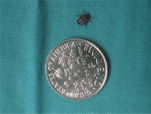 When removing a tick, avoid handling it directly. Wear gloves or handle with Kleenex since ticks can pass infections to people as well. Grasp the tick with tweezers close to the skin. Extract the tick by pulling straight out of skin. Don't squeeze, twist or leave any legs behind. Disinfect the area and dispose of ticks in rubbing alcohol.
When removing a tick, avoid handling it directly. Wear gloves or handle with Kleenex since ticks can pass infections to people as well. Grasp the tick with tweezers close to the skin. Extract the tick by pulling straight out of skin. Don't squeeze, twist or leave any legs behind. Disinfect the area and dispose of ticks in rubbing alcohol.
Here's a photo of a typical tick, born and bred in Las Vegas and recently extracted from one of my Shih Tzu patients named Kane. Kane never leaves the state, doesn't hike in the mountains, and enjoys the comforts of a house-dog lifestyle. A tick was discovered on Kane after a day of supervising his owner's yard work and shrub trimming.
Maybe Kane's story will be an eye-opener for city dwelling pet owners. Pet parasites like fleas, ticks and mosquitoes still lurk in that urban jungle.
Visit the Dogs & Ticks website for more information ticks, diseases and prevention.
Featured veterinarian known as "Dr. Debbie" on national pet radio program, Animal Radio. Ebook author of "Yorkshire Terriers: How to Be Your Dog's Best Friend"; "Pugs: How to Be Your Dog's Best Friend"; "Mini Schnauzers: How to Be Your Dog's Best Friend"; and "Shih Tzu: How to Be Your Dog's Best Friend." Dr. Debbie's books.
Visit Website
Animal Radio News - Stacey Cohen
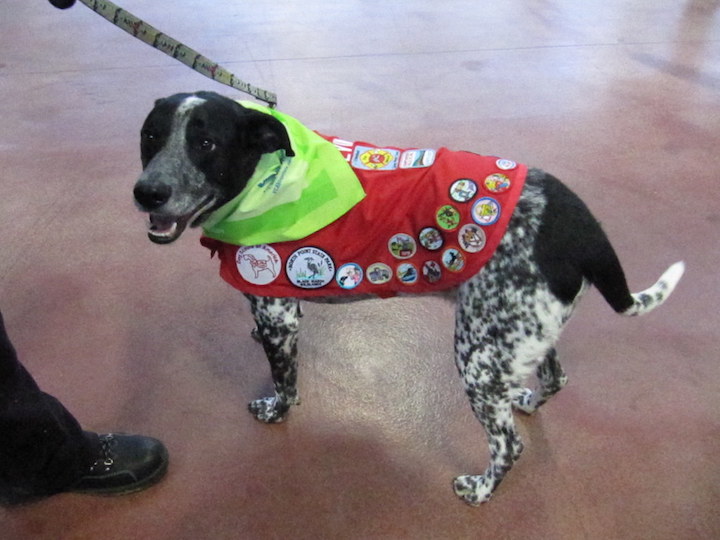 Dog Scouts of America
Dog Scouts of America
They've got badges and campouts, cookie drives and troops in 22 states. The Dog Scouts of America, founded by Lonnie Olson, even has a motto or two as the half-human, half-hound organization goes about the business of doing good deeds. One of the first badges for Jasper, a 3-year-old collie-lab mix, was disaster preparedness. After all, he lives with his owners just southeast of San Francisco, where you have to be aware of earthquakes and other natural disasters. Jasper and his humans belong to Troop 198 in Santa Clara and have earned 18 badges altogether. Each, the humans said, has made him a better dog. "We go outside and I know he's going to be safe," Verdahl said. "If there's an emergency, I know he will listen to me." There are 682 Dog Scouts who belong to 38 troops across the country. The organization has around 80 badges. Dogs are not required to earn badges beyond the first one, for basic obedience and appropriately called the Dog Scout Badge. The Scouts have two mottos. For humans: "Our dogs' lives are much shorter than our own. We should help them enjoy their time with us as much as we can." For dogs: "Let us learn new things that we become more helpful." Both serve as inspiration for the group's grossest badge: "Clean Up America." It consists of picking up piles left behind by other dogs on trails, parks and beaches.
Bill Regulates Owning Wild Animals
Ohio animal owners are roaring over a bill that would institute strict regulations that could result in many wild animals being taken away from their owners. Animal owners, activists and pet organizations packed a hearing room in Columbus to testify against Senate Bill 310. Sponsored by Zanesville Republican Sen. Troy Balderson, the bill would create a list of wild animals that would be deemed dangerous, including big cats, bears, some primates and certain types of snakes. The bill would establish stringent permitting policies and eliminate the private purchase of dangerous wild animals in the state. The legislation resulted from the tragedy last October near Zanesville, where Terry Thompson let his 56 wild animals loose. Thompson, 62, released the grizzly bears, lions and tigers from their dilapidated cages and then committed suicide.
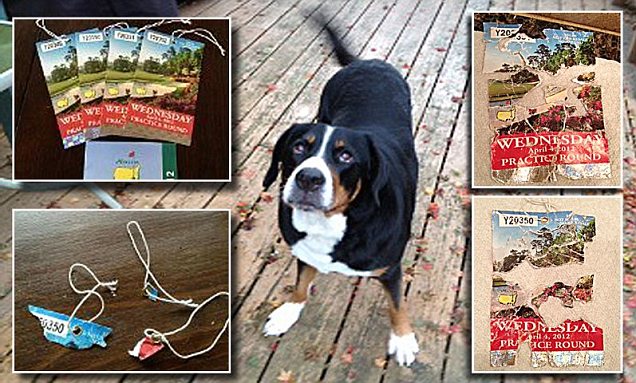 No Rain, No Hail and No Vomit!
No Rain, No Hail and No Vomit!
A Seattle resident is leaving little doubt that he's a huge golf fan. Russ Berkman tells sports radio station KJR that he made his dog throw up after discovering that the animal had eaten his tickets to this year's Masters tournament. Berkman returned home one day to discover that his pet pooch had snacked on all four of his tickets. Rather than call off his trip, Berkman fed the dog Hydrogen peroxide, which is safe for animals and then dug out the pieces of the tickets from the dog's vomit. Berkman then contacted the Masters and provided photographic proof of his destroyed tickets in an attempt to get new passes. They obliged. As a result, Berkman will get to enjoy his trip!
Benefits Of Pets At Work
A new study supports the stress-reducing benefits of bringing your pooch to work - to play with, look at and pet while working. According to a Virginia Commonwealth University Study, having a dog at work not only reduces the owners' stress level but also increased the level of job satisfaction for other employees as well. The study was published in the International Journal of Workplace Health Management. "Dogs in the workplace can make a positive difference," said head researcher Randolph T. Barker. "The differences in perceived stress between days the dog was present and absent were significant. The employees as a whole had higher job satisfaction than industry norms." According to The Humane Society of the United States, there are numerous benefits to having dogs at work, including improved staff morale, worker productivity, and camaraderie among employees.
 Canine Fender Bender
Canine Fender Bender
Parking lot fender benders might not be that uncommon, but parking lot fender benders caused by a trio of canines are a different matter. According to insurance reports by the AlfaStrakhovanie Group, an unnamed woman recently returned from a shopping trip at the mall to discover her car had been hit by a vehicle that was apparently driven by three dogs. She later learned that the owner of the car had left it running with the animals inside and they somehow managed to put it in gear. The woman took pictures of the accident, explaining that she never thought anyone would believe the story if there wasn't evidence. The insurance company, however, says the incident has been recognized as a legitimate insurance event.
 Listen to the entire Podcast of this show (#1038)
Listen to the entire Podcast of this show (#1038)





